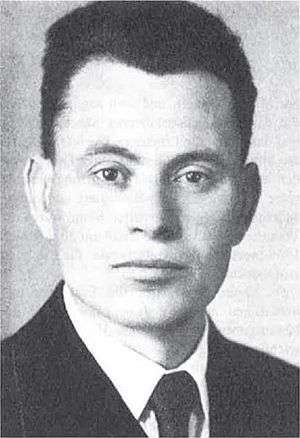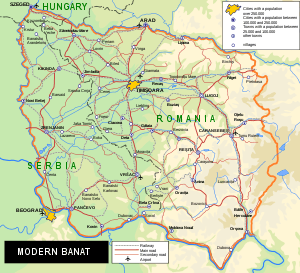Sepp Janko


Dr. (Josef) "Sepp" Janko (November 9, 1905, Ernsthausen (Hungarian: Ernesztháza, Ernőháza, Serbian: (now) Банатски Деспотовац, Banatski Despotovac), the Bánát (Банат, Bánság) (now Central Banat, Vojvodina, Serbia), Royal Hungary, Imperial & Royal Austria — 25 September 2001, Belgrano,[1] Argentina) was a Chairman of the Danube Swabian German Cultural Association (Schwäbisch-Deutschen Kulturbundes) in Yugoslavia in 1939 and an SS-Obersturmführer (First Lieutenant) during World War II.
Life
Janko was born on 9 November 1905, in Ernsthausen (Serbian: Ernestovac (Despotovac)), the son of a farmer holding a small plot.
He studied law in Graz, Austria, and was a rather unassuming personality until his appointment to the presidency of the Cultural Association.[2]
Sepp Janko was a moderate fascist in politics and on 6 June 1939 he was elected the president of the Swabian-German Cultural Association in Yugoslavia at the suggestion of the Reich agency Volksdeutsche Mittelstelle (VoMi). On 12 December 1940 Sepp Janko was awarded the Yugoslav Kronen-Orden Class III by the Prime Minister Cvetković.
After the invasion of the Wehrmacht early in 1941, the Cultural Association was disbanded and VoMi organised the Deutsche Volksgruppe in Serbien und Banat (DVSB) under Janko's leadership. Janko was simultaneously appointed an SS Obersturmführer in the Nazi occupied Banat region of Serbia.
"Like other wartime [German] minority organizations, the DVSB was restructured along the lines of the NSDAP. Its most important branch was the paramilitary formation, the Deutsche Mannschaft, which here, as elsewhere, came under control of the SS. Janko and the DVSB cooperated fully with VoMi, and as a step in the minority's total nazification, it even introduced a system of classifying the local Volksdeutsche similar to that used by the DVL in Poland."[3]
World War II
After an initial burst of enthusiasm to join the German sponsored Selbschutz (self defence force) those devoutly religious Danube Swabians who were appalled by Nazi ideology quickly lost interest in the Third Reich.
"The Waffen SS immediately enlisted 600 Volksdeutsche, and in July it announced plans for the formation of an exlcusively German regiment. But in the Banat the SS encountered competition from the Wehrmacht, which had in mind sponsoring its own unit, a militia force of some 8,000 men. Himmler, alarmed by this development, took the case to Hitler and secured permission not only to create a new, exclusively Volksdeutsche SS division but also to take over the Wehrmacht's militia."[4]
Voluntary enlistment collapsed quickly and in August 1941 the Waffen-SS enforced conscription and drafted local men into the Waffen-SS.[5]
Janko objected and took the position that the legal obligation to provide services in the German Army for the members of the German ethnic groups (Volksdeutsche) did not exist, because it violated the Hague Regulations on war. Heinrich Himmler responded with dismay: “Es ist unmöglich, dass Deutsche in Europa irgendwo als Pazifisten herumhocken und sich von unseren Bataillonen beschützen lassen …“ ("It is impossible that Germans can be sitting around somewhere in Europe as pacifists and be protected by our battalions ...")[6] Janko responded by offering to set up a regiment of about three thousand local ethnic Germans, with limited service interaction with the Wehrmacht and Waffen-SS.
In April 1942, Himmler created the 7th SS Volunteer Mountain Division Prinz Eugen and began to conscript Volksdeutsche from Banat and Romania. The Division was based in Banat but served across former Yugoslavia.
Escape
Janko was able to escape from the Communist onslaught in late 1944 to Austria. There he was arrested by the Americans and taken to the camp Wolfsberg in Carinthia.[7] He was interned with the Nazi ambassador in Ustache Zagreb, Siegfried Kasche, and the German minority leader in Croatia, Branimir Altgayer. Both were delivered by the British to Josip Broz Tito and executed. Janko was able to flee internment to Italy before his extradition from the camp. In 1951 he fled to Argentina with a pass from the Red Cross, issued in the name of José Petri.[8] (Jose stands for Joseph, Petri is the maiden name of his wife Leni Petri, with whom he was married in church 1936)
Janko was indicted by the Communist Yugoslav government for war crimes. At the instigation of the Yugoslav Government was arrested and imprisoned on an island until his extradition. After personal intervention of the Argentinean President Janko was acquitted and released.
Janko remained in Belgrano, Buenos Aires until his death. There he found a job at a dairy operation and published books.
Works
- 1943: Reden und Aufsätze (In a series of the German ethnic group in Banat and Serbia). Printed by the German ethnic group, Betschkerek 1943 and Ladislaus Frank, Belgrad 1943.
- 1982: Weg und Ende der deutschen Volksgruppe in Jugoslawien. Stocker: Graz und Stuttgart.
- 1983: Weg und Ende der deutschen Volksgruppe in Jugoslawien, 2. Edition. Stocker: Graz und Stuttgart 1983.
See also
- Schwäbisch-Deutscher Kulturbund
Literature
- Karner, Stefan, Die deutschsprachige Volksgruppe in Slowenien. Aspekte ihrer Entwicklung 1939-1997, (Klagenfurt u. a. 1998), Anm.95, p. 45 (nachfolgend zit. als: Karner, Die deutschsprachige Volksgruppe19)
- Arnold Suppan, Jugoslawien und Österreich 1918-1938: bilaterale Aussenpolitik, S:721 ff, Verlag für Geschichte und Politik Oldenbourg
- Hans Rasimus, Als Fremde im Vaterland, (München 1989)
- Bundesarchiv Koblenz: R57/165
- Sepp Janko, Weg und Ende der deutschen. Volksgruppe in Jugoslawien. 2. Auflage. (der Leopold Stocker Verlag, Graz—Stuttgart)
- Anton Scherer, Suevia-Pannonica, (Graz 2009)
- Valdis O. Lumans, Himmler's Auxiliaries, The Volksdeutsche Mittelstelle and the German Minorities of Europe, 1939-1945 (1993)
- Boehm, Johann Die deutsche Volksgruppe in Jugoslawien 1918-1941: Innen- und Aussenpolitik http://books.google.rs/books?id=uAbc0MbRQqEC&pg=PA25&hl=en#v=onepage&q=janko&f=false
References
- ↑ or General Belgrano
- ↑ Karner, Stefan, Die deutschsprachige Volksgruppe in Slowenien. Aspekte ihrer Entwicklung 1939-1997, (Klagenfurt u. a. 1998), Anm. 95, Page.45 (nachfolgend zit. als: Karner, Die deutschsprachige Volksgruppe19)
- ↑ Valdis O. Lumans, Himmler's Auxiliaries, The Volksdeutsche Mittelstelle and the German Minorities of Europe, 1939-1945 (1993), page.234.
- ↑ Valdis O. Lumans, Himmler's Auxiliaries, The Volksdeutsche Mittelstelle and the German Minorities of Europe, 1939-1945 (1993), page. 235.
- ↑ Hans Rasimus, Als Fremde im Vaterland, (München 1989), page 524.
- ↑ Bundesarchiv Koblenz: R57/165
- ↑ Anton Scherer: Suevia Pannonica, Graz 2009. S. 112-114.
- ↑ Anton Scherer, Suevia-Pannonica, (Graz 2009), pages 112 - 114.
|